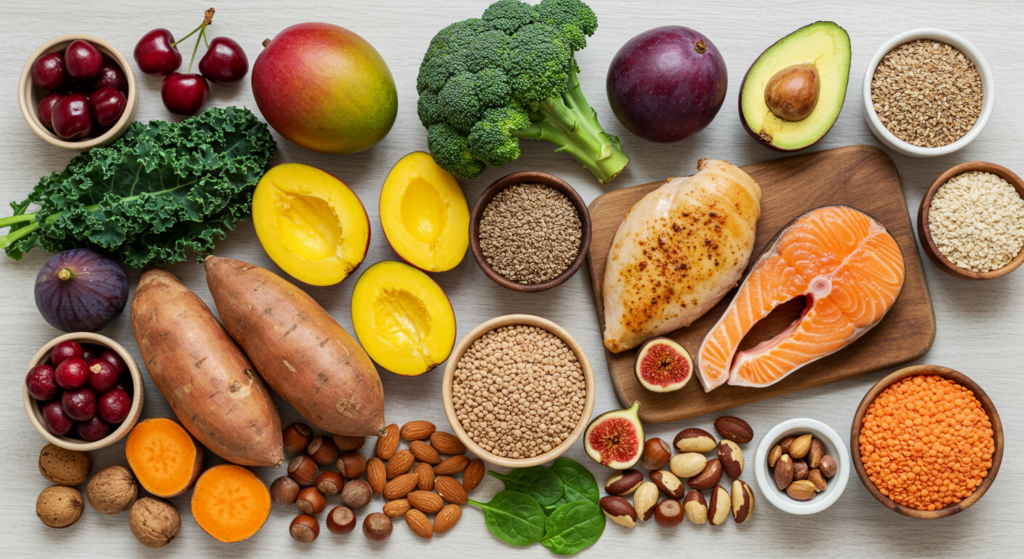What is the Diet for FFS? For many transgender women, Facial Feminization Surgery (FFS) is a deeply significant step in their transition journey. It’s a process that goes beyond mere physical alteration; it’s about aligning one’s outward appearance with their inner identity, fostering confidence, and ultimately, feeling more at home in their own skin. The desire for an attractive face that reflects their true selves is a powerful motivator for seeking FFS. While the surgical procedures themselves are paramount, the journey to achieving and maintaining the best possible results involves more than just the operating room. One crucial, often overlooked aspect is diet. This comprehensive guide will delve into the dietary considerations before, during, and after FFS, providing you with the knowledge to nourish your body and support your journey towards the attractive face you envision.

Table of Contents
The Integral Role of Diet in Your FFS Journey
Think of your body as a finely tuned machine. Just as a high-performance vehicle requires premium fuel to operate optimally, your body needs the right nutrients to prepare for, recover from, and maintain the results of a complex surgical procedure like FFS. Diet plays a multifaceted role in this process:
- Pre-Surgery Preparation: A well-nourished body is better equipped to handle the stress of surgery. Specific nutrients can bolster the immune system, improve skin elasticity, and promote overall health, setting the stage for a smoother procedure and recovery.
- Post-Surgery Healing: The period after FFS is crucial for healing and tissue regeneration. The right foods can accelerate this process, reduce inflammation, minimize swelling, and support the body’s natural repair mechanisms, contributing significantly to the final aesthetic outcome and an attractive face.
- Long-Term Maintenance: Even after the initial recovery, maintaining a healthy diet is essential for long-term skin health, collagen production, and overall well-being. This contributes to the longevity of your FFS results and ensures your attractive face remains vibrant and youthful.
- Emotional Well-being: The connection between diet and mental health is well-established. Nourishing your body with wholesome foods can positively impact your mood, energy levels, and overall sense of well-being during a potentially emotionally and physically demanding time.

Pre-Surgery Diet: Preparing Your Body for Success
The weeks leading up to your FFS are a critical time to optimize your health through diet. The goal is to ensure your body is in the best possible condition to undergo surgery and initiate the healing process effectively. Here’s a detailed breakdown of what to focus on:
1. Prioritize Protein for Tissue Repair
Protein is the building block of tissues and plays a vital role in repairing and rebuilding after surgery. Adequate protein intake before FFS can help your body prepare for the tissue trauma and lay the groundwork for efficient healing.
Good Sources of Protein:
- Lean Meats: Chicken breast, turkey, fish (salmon, tuna, cod), lean beef.
- Plant-Based Proteins: Lentils, beans, chickpeas, tofu, tempeh, edamame, quinoa, nuts, and seeds.
- Eggs: A complete protein source.
- Dairy (if tolerated): Greek yogurt, cottage cheese, milk.
- Protein Powders (use with caution and consult your doctor): Whey, soy, pea, or rice protein.
Aim for: A consistent intake of protein throughout the day, rather than consuming a large amount in one sitting. Consult with a nutritionist or your surgeon for personalized recommendations based on your individual needs and activity level.
2. Load Up on Fruits and Vegetables for Essential Nutrients
Fruits and vegetables are packed with vitamins, minerals, and antioxidants that are crucial for overall health and play specific roles in preparing your body for surgery and supporting healing.
Key Nutrients and Their Benefits:
- Vitamin C: Essential for collagen production, wound healing, and immune function. Found in citrus fruits, berries, bell peppers, broccoli, and spinach.
- Vitamin A: Supports skin health, immune function, and cell growth. Found in carrots, sweet potatoes, leafy greens, and liver.
- Vitamin E: An antioxidant that protects cells from damage and supports skin health. Found in almonds, sunflower seeds, avocados, and spinach.
- Zinc: Crucial for immune function, wound healing, and cell growth. Found in oysters, red meat, poultry, beans, nuts, and seeds.
- Selenium: An antioxidant that supports immune function and thyroid health. Found in Brazil nuts, tuna, and eggs.
Focus on a Rainbow of Colors: Incorporate a variety of colorful fruits and vegetables into your diet to ensure you’re getting a wide range of nutrients. Aim for at least five servings per day.
3. Embrace Healthy Fats for Skin Health and Reduced Inflammation
Healthy fats are essential for maintaining skin elasticity, reducing inflammation, and supporting hormone production. Incorporating them into your pre-surgery diet can contribute to healthier skin and a potentially smoother recovery.
Good Sources of Healthy Fats:
- Avocados: Rich in monounsaturated fats, vitamin E, and other beneficial nutrients.
- Nuts and Seeds: Almonds, walnuts, chia seeds, flax seeds, and pumpkin seeds are packed with healthy fats, fiber, and antioxidants.
- Olive Oil: A good source of monounsaturated fats and antioxidants.
- Fatty Fish (Salmon, Mackerel, Sardines): Rich in omega-3 fatty acids, which have anti-inflammatory properties.
Limit Saturated and Trans Fats: These unhealthy fats can contribute to inflammation and hinder overall health. Found in processed foods, fried foods, and some animal products.
4. Stay Hydrated for Optimal Bodily Functions
Water is essential for virtually every bodily function, including nutrient transport, waste removal, and maintaining skin hydration. Adequate hydration is crucial before surgery to support circulation and overall well-being.
Aim for: At least 8-10 glasses of water per day. You can also include other hydrating fluids like herbal teas and clear broths.
Monitor Your Urine: Pale yellow urine is a good indicator of adequate hydration.
5. Limit Processed Foods, Sugar, and Unhealthy Fats
These dietary components can contribute to inflammation, hinder immune function, and negatively impact overall health, potentially affecting your body’s ability to heal efficiently after surgery.
Foods to Limit or Avoid:
- Processed Foods: Packaged snacks, fast food, processed meats.
- Sugary Drinks: Soda, fruit juices with added sugar, sweetened beverages.
- Refined Carbohydrates: White bread, pasta, pastries.
- Fried Foods: High in unhealthy fats and often processed.
- Excessive Alcohol: Can dehydrate the body and interfere with healing.
- High Sodium Foods: Can contribute to fluid retention and swelling.
6. Consider Limiting Caffeine
While moderate caffeine intake is generally acceptable, excessive consumption can lead to dehydration and potentially interfere with sleep. It’s advisable to reduce your caffeine intake in the days leading up to surgery.
7. Be Mindful of Potential Allergens and Sensitivities
If you have any known food allergies or sensitivities, ensure you strictly avoid those foods in the weeks leading up to your surgery. Allergic reactions can compromise your health and potentially complicate the surgical procedure and recovery.
8. Discuss Supplements with Your Doctor
While a healthy diet should provide most of the necessary nutrients, your doctor or a registered dietitian might recommend certain supplements in specific cases. It is crucial to discuss any supplements you are taking or considering with your surgeon, as some supplements can interact with anesthesia or increase the risk of bleeding.
Supplements that might be discussed (always under medical supervision):
- Multivitamin: To ensure you’re meeting your basic nutrient needs.
- Vitamin C: To further support collagen production and wound healing.
- Zinc: To boost immune function and promote tissue repair.
- Bromelain: An enzyme found in pineapple that may help reduce swelling and bruising (discuss with your doctor as it can interact with blood thinners).
- Arnica Montana: A homeopathic remedy sometimes used to reduce bruising and swelling (discuss with your doctor).
Supplements to potentially avoid before surgery (discuss with your doctor):
- Vitamin E (in high doses): May increase the risk of bleeding.
- Fish Oil (in high doses): May increase the risk of bleeding.
- Ginkgo Biloba: May increase the risk of bleeding.
- Garlic (in high doses): May increase the risk of bleeding.
- St. John’s Wort: Can interact with anesthesia and other medications.
Important Note: This information is for general guidance only and should not replace the advice of your healthcare professionals. Always consult with your surgeon and a registered dietitian for personalized dietary recommendations tailored to your specific needs and medical history.
Post-Surgery Diet: Nurturing Recovery and Healing
The period immediately following your FFS is crucial for allowing your body to heal and for the swelling to subside, revealing the attractive face you’ve been waiting for. Your diet during this time plays a vital role in supporting this process.
1. Focus on Easily Digestible and Soft Foods
Immediately after surgery, you may experience some discomfort and difficulty chewing. Opt for soft, easily digestible foods that won’t put excessive strain on your jaw and facial muscles.
Good Options:
- Clear Liquids: Water, broth, clear juices (apple, grape).
- Smoothies: Made with fruits, vegetables, protein powder (if tolerated), and yogurt or milk.
- Pureed Soups: Creamy vegetable soups, bone broth.
- Mashed Potatoes: Smooth and easy to swallow.
- Scrambled Eggs: Soft and a good source of protein.
- Yogurt: Smooth and provides protein and probiotics.
- Applesauce: Easy to digest and provides some nutrients.
- Cooked Cereals: Oatmeal, cream of wheat (ensure they are soft).
Avoid: Hard, crunchy, chewy, or spicy foods that could irritate the surgical sites or require excessive chewing.
2. Prioritize Protein for Tissue Repair and Regeneration
As mentioned earlier, protein is essential for healing. Continue to prioritize protein intake in your post-surgery diet to support tissue repair and regeneration, which is crucial for achieving the desired aesthetic outcome and an attractive face.
Continue with the good protein sources mentioned in the pre-surgery section, focusing on softer preparations:
- Softly cooked chicken or fish (flaked).
- Blended protein shakes.
- Soft tofu or tempeh.
- Well-cooked lentils or beans (mashed if needed).
- Greek yogurt.
- Cottage cheese (if tolerated).
3. Stay Hydrated to Aid Healing and Reduce Swelling
Adequate hydration is even more critical after surgery to help flush out toxins, reduce swelling, and promote overall healing.
Continue to aim for: At least 8-10 glasses of water or other hydrating fluids per day.
Consider: Electrolyte-rich drinks (like coconut water or diluted sports drinks) in moderation, especially if you’re experiencing any nausea or vomiting.
4. Focus on Vitamins and Minerals for Immune Support and Healing
Continue to consume fruits and vegetables in forms that are easy to manage, such as smoothies, pureed soups, and soft cooked options. These will provide essential vitamins and minerals to support your immune system and aid the healing process.
Focus on:
- Vitamin C-rich foods: Blended berries, citrus fruits in smoothies, pureed bell peppers in soup.
- Vitamin A-rich foods: Sweet potato puree, blended carrots in soup.
- Foods with zinc: Softly cooked beans or lentils, blended nuts and seeds in smoothies.
5. Manage Swelling Through Diet
Swelling is a common side effect after FFS. While it will gradually subside over time, certain dietary choices can help manage it.
Foods that may help reduce swelling:
- Pineapple: Contains bromelain, an enzyme with anti-inflammatory properties (discuss with your doctor).
- Ginger: Has anti-inflammatory effects and may help with nausea. Can be consumed in tea or added to smoothies.
- Turmeric: Another potent anti-inflammatory spice. Can be added to soups or smoothies.
- Hydrating foods: Fruits and vegetables with high water content like cucumbers, watermelon, and celery.
Foods to limit that may contribute to swelling:
- High sodium foods: Processed foods, salty snacks.
- Excessive sugar: Can promote inflammation.
6. Gradually Reintroduce Solid Foods
As your healing progresses and you feel more comfortable, you can gradually reintroduce solid foods back into your diet. Pay attention to your body’s signals and don’t rush the process. Start with softer textures and gradually move towards more solid consistencies.
7. Listen to Your Body and Avoid Irritants
Pay close attention to how your body reacts to different foods. If certain foods cause discomfort, pain, or irritation around the surgical sites, avoid them. Spicy, acidic, and very hot foods can sometimes be irritating.
8. Avoid Alcohol and Smoking
Alcohol can dehydrate the body and interfere with healing. Smoking significantly impairs blood flow and can drastically hinder the healing process, increasing the risk of complications and negatively impacting the final aesthetic outcome and your attractive face. It is crucial to avoid both alcohol and smoking before and after FFS.
9. Consider Probiotics for Gut Health
Antibiotics are often prescribed after surgery to prevent infection. These can sometimes disrupt the balance of bacteria in your gut. Consuming probiotic-rich foods or supplements (with your doctor’s approval) can help restore gut health.
Good Sources of Probiotics:
- Yogurt with live and active cultures.
- Kefir.
- Sauerkraut (in moderation, as it can be salty).
- Kimchi (in moderation, as it can be spicy).
10. Continue to Discuss Supplements with Your Doctor
Your doctor may recommend continuing certain supplements after surgery to support healing and recovery. Always follow their guidance.
Important Note: This information is for general guidance only and should not replace the advice of your healthcare professionals. Your surgeon will provide specific post-operative instructions, including dietary recommendations tailored to your individual needs and the procedures you underwent. Follow their instructions carefully.

Long-Term Diet: Maintaining Your Results and Overall Well-being
Once you’ve recovered from your FFS, maintaining a healthy and balanced diet remains crucial for long-term skin health, overall well-being, and potentially enhancing the longevity of your results, ensuring your attractive face continues to radiate.
1. Embrace a Balanced and Varied Diet
Focus on a diet rich in whole, unprocessed foods, including plenty of fruits, vegetables, lean protein, and healthy fats. This will provide your body with the essential nutrients it needs to thrive.
2. Prioritize Antioxidant-Rich Foods for Skin Health
Antioxidants help protect your skin from damage caused by free radicals, which can contribute to premature aging. Incorporate plenty of colorful fruits and vegetables that are rich in antioxidants.
Examples: Berries, leafy greens, bell peppers, tomatoes, carrots, sweet potatoes.
3. Continue to Consume Healthy Fats for Skin Elasticity
Healthy fats, particularly omega-3 fatty acids, play a vital role in maintaining skin elasticity and reducing inflammation. Continue to include sources like avocados, nuts, seeds, and fatty fish in your diet.
4. Limit Processed Foods, Sugar, and Unhealthy Fats
These dietary components can negatively impact skin health, contribute to inflammation, and hinder overall well-being. Make them an occasional treat rather than a regular part of your diet.
5. Stay Hydrated Consistently
Make drinking enough water a daily habit. It’s essential for maintaining skin hydration, supporting all bodily functions, and contributing to a healthy and radiant appearance.
6. Consider Collagen-Boosting Foods
Collagen is a protein that provides structure and elasticity to the skin. While your body naturally produces collagen, production decreases with age. Certain foods can help support collagen production.
Examples: Bone broth, foods rich in vitamin C (as it’s needed for collagen synthesis), and protein-rich foods.
7. Pay Attention to Your Body’s Needs
Listen to your body’s signals and adjust your diet accordingly. If you notice any sensitivities or intolerances, address them.
8. Consult with a Registered Dietitian
A registered dietitian can provide personalized guidance on developing a long-term healthy eating plan that meets your individual needs and supports your overall health and well-being.
Beyond Diet: Complementary Factors for an Attractive Face and Overall Well-being
While diet is a crucial component, it’s important to remember that other lifestyle factors also play a significant role in achieving and maintaining an attractive face and overall well-being:
- Hydration: As emphasized throughout this guide, staying adequately hydrated is essential.
- Sleep: Getting sufficient quality sleep is crucial for tissue repair, hormone regulation, and overall health. Aim for 7-9 hours of sleep per night.
- Stress Management: Chronic stress can negatively impact your skin and overall health. Practice stress-reducing techniques like meditation, yoga, or spending time in nature.
- Skincare Routine: A consistent skincare routine tailored to your skin type is essential for maintaining healthy and radiant skin.
- Sun Protection: Protecting your skin from sun damage is crucial for preventing premature aging and maintaining the results of your FFS. Wear sunscreen daily.
- Exercise: Regular physical activity promotes good circulation, reduces stress, and contributes to overall health and well-being.
Conclusion: Nourishing Your Beauty from Within
Your journey to an attractive face through Facial Feminization Surgery is a significant investment in yourself and your well-being. While the surgical procedures are the foundation, remember that nourishing your body with the right foods before, during, and after surgery plays a vital role in optimizing your results, promoting healing, and maintaining your radiant beauty for years to come. By prioritizing a balanced and nutrient-rich diet, staying hydrated, and following the guidance of your healthcare professionals, you can empower your body to heal effectively and embrace the attractive face that reflects your true, authentic self. Remember that consistency and a holistic approach to your health are key to long-term success and happiness on your transition journey.
Visit Dr.MFO Instagram profile to see real patient transformations! Get a glimpse of the incredible results achieved through facial feminization surgery and other procedures. The profile showcases before-and-after photos that highlight Dr. MFO’s expertise and artistic vision in creating natural-looking, beautiful outcomes.
Ready to take the next step in your journey? Schedule a free consultation with Dr. MFO ( Best Facial Feminization Surgeon for You) today. During the consultation, you can discuss your goals, ask any questions you may have, and learn more about how Dr. MFO can help you achieve your desired look. Don’t hesitate to take advantage of this free opportunity to explore your options and see if Dr. MFO is the right fit for you.









